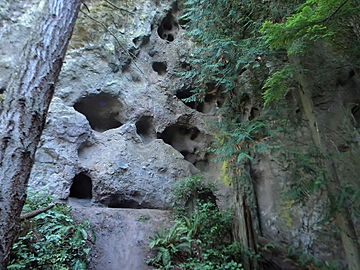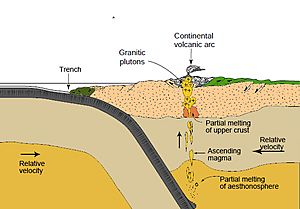Tamanowas Rock facts for kids
Quick facts for kids Tamanowas Rock |
|
|---|---|
| Chimacum Rock, Tamanous Rock | |
 |
|
| Highest point | |
| Elevation | 440 ft (130 m) |
| Prominence | 150 ft (46 m) |
| Geography | |
| Location | Jefferson County, Washington, US |
| Parent range | Near Olympic Mountains |
| Topo map | USGS Port Townsend South, WA |
| Geology | |
| Mountain type | Batholith |
| Tamanowas Rock Sanctuary | |
|---|---|
| Nearest city | Chimacum, Washington |
| Area | 84.4 acres (34.2 ha) |
| Established | 1990s–December 21, 2012 |
| Governing body | Jamestown S'Klallam Tribe |
Tamanowas Rock, also known as Chimacum Rock, is a tall rock formation with cool caves and cracks. It's about 150 feet high and sits in a forest close to Anderson Lake State Park near Port Townsend, Washington. This rock is very special and sacred to the Coast Salish peoples, who are Native American tribes from the Pacific Northwest. Many people visit it as a pilgrimage site. In 2015, Tamanowas Rock was added to the National Register of Historic Places, which means it's an important historical place.
Contents
History of Tamanowas Rock
Tamanowas Rock has a long and interesting history. People believe it was first used about 10,000 years ago by the Chimakum (or Chemacum) people. This is why it's also called "Chimacum Rock." You can find the name "Chimacum" in other places nearby too.
According to old stories, the rock might have been a safe place during a huge tsunami caused by the 1700 Cascadia earthquake. Even earlier, it might have been a lookout spot for hunting large animals like mastodon, which are now extinct. The word "Tamanowas" means "spirit power" in the Klallam language.
Protecting Tamanowas Rock
This special site is either a registered archaeological site or is being considered to become one by the Washington State Department of Archaeology. This helps protect its history and importance.
In 2013, the Jamestown S'Klallam Tribe bought the rock and about 62 acres of land around it. They did this to protect the site. Before this, other groups like Washington State Parks, the Bullitt Foundation, and Jefferson Land Trust helped buy parts of the land, starting in 2009. The tribe added this new land to 22 acres they already owned.
Before the tribe owned it, Tamanowas Rock was a popular place for rock climbing. However, when the S'Klallam Tribe took ownership, they stopped rock climbing to help preserve the sacred nature of the site.
Vandalism at the Rock
In 2014, the rock was marked with graffiti. This act of vandalism caused a lot of attention both in the United States and around the world.
Geology of the Rock

Tamanowas Rock is made of a type of rock called Eocene subaerial adakitic lava and lava breccia. This means it formed from lava that cooled on land. Similar rock formations are found in the Blue Hills about 60 kilometers away. Scientists believe both were created when the Kula-Farallon Ridge (an ancient underwater mountain range) slid beneath North America. These rocks might be connected as part of a larger chain of volcanoes, known as a magmatic arc.
 | Anna J. Cooper |
 | Mary McLeod Bethune |
 | Lillie Mae Bradford |


